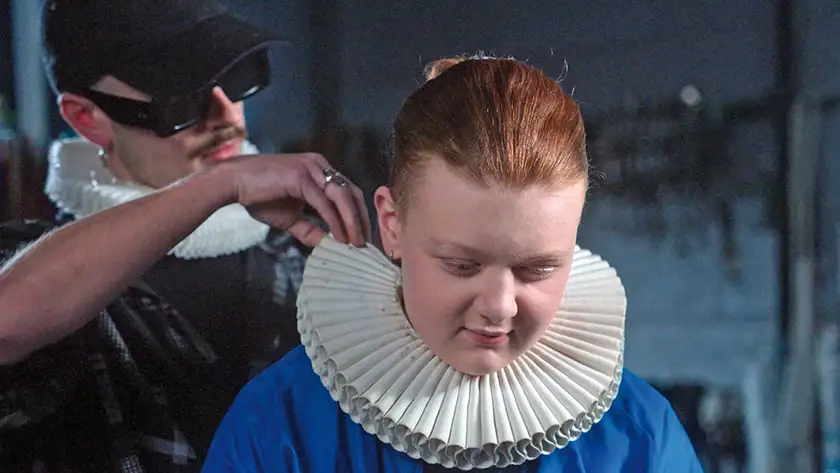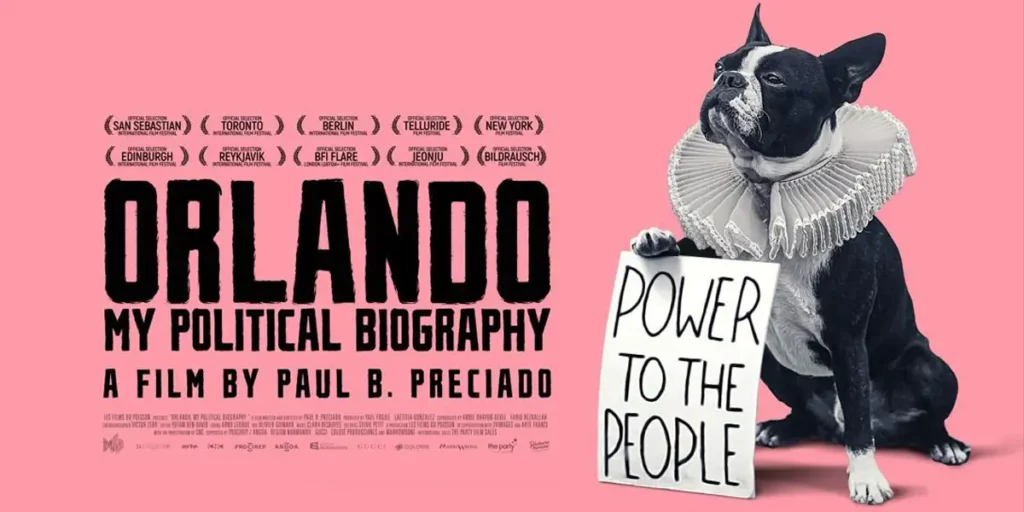Directed by Paul B. Preciado, Orlando, My Political Biography is a uniquely built documentary that shares a timely and important story.
Director: Paul B. Preciado
Genre: Documentary, Queer
Run Time: 102′
UK & Ireland Release: July 5, 2024 in cinemas
US Release: out now on digital and on demand!
“Virginia Wolf wrote my biography in 1928,” says one of the characters at the beginning of Orlando, My Political Biography. But what does Virginia Wolf have to say about the lives of people in the present world, one that looks so different to the one the author lived in? According to this documentary, Wolf’s “Orlando” actually has some significant insight into this matter, particularly for the trans community this film focuses on.
The movie, directed by Paul B. Preciato, brings together 26 trans and non-binary people of different ages living in today’s world as they explore their connection with the 1928 novel written by Wolf.
If you have read “Orlando”, you would know that the main character in Wolf’s novel changes gender during the course of the narrative. The director expands on this by casting a group of contemporary trans and non-binary people: all of them play Orlando but looking at today’s world and how past and present connect with each other, just like the lines between reality and fiction quickly become blurred. The documentary uses the narration of personal transformations to showcase the stories of modern-day Orlandos, transgender people who risk their lives on a daily basis to find and be themselves by challenging the current status quo, which is not so dissimilar to what Orlando did in their own story written in 1928.
Orlando, My Political Biography tells a fascinating story, shining a light on the contemporary potential of Virginia Wolf, particularly for the trans community. How a 20th-century book could understand trans and nonbinary identities a lot better than modern media does today is especially interesting. This is particularly true if we look at the current political climate. where in the UK, for example, trans rights and lives are constantly under threat during the current general elections. It’s also a very clever way of modernising what is now considered a classic in English literature, as the documentary makes some very clear – and perhaps too obvious at times – parallels between the film’s narrative and the story in the book Orlando.
From the title, it is immediately clear that Orlando, My Political Biography is first and foremost a political statement, and, as such, it is incredibly successful. However, it is also a documentary. In terms of its filmmaking techniques, Preciado uses some very meta cinematic techniques to tell the story: the protagonists often address the audience directly by looking at the camera and they also directly refer to the fact that we are watching a film – and they are filming one – multiple times in their interviews. Similarly, the audience gets to see part of the filmmaking process itself, witnessing the make-up being done while the protagonists get ready to film. This is especially fascinating: the continuous references to the fact that this is a documentary highlight its political stance very well.

Visually, Orlando, My Political Biography is very poetic and visionary, which is not entirely common when it comes to documentary filmmaking. For better or worse, the genre often ends up being fairly repetitive, especially when the traditional documentary techniques of talking head interviews are heavily used. But when it comes to Preciado’s film, it always remains visually interesting, managing to hold our attention until the very end. it uses some of the typical features of the genre, like voiceovers and interviews, but also some non-traditional techniques that we are not used to seeing in this type of movie.
In a particularly fascinating sequence, the documentary also features a musical moment that I was not entirely sure about. While at first, that feels out of place with the tradition of documentary filmmaking, it also perfectly fits with the general tone of Orlando, My Political Biography. However, the film seems to want to do too much, including multiple strands of narration to tell its overall story. Partly talking-heads documentary, partly a reflection on the history of trans people and trans rights, and at times musical adjacent, a lot of it somehow feels confused over what the film wants to do in terms of its overall narrative and tone.
Overall, Orlando, My Political Biography is an important documentary that I hope reaches the widest audience possible due to the urgency of its message and political relevance in today’s climate when it comes to discussions around the rights of trans and non-binary people. Despite some flaws in its storytelling, it also makes fascinating use of filmmaking techniques, innovating the documentary genre to create a hybrid of genres that we are not often used to seeing on screen. It is also a fascinating way to look back at books written in the past with an outlook on the present that was not necessarily obvious even to those in the audience who may be familiar with Virginia Wolf’s works.
Orlando, My Political Biography will be released in UK and Irish cinemas on 5 July, 2024. The film is now available to watch on digital and on demand in the US & Canada and more countries.

